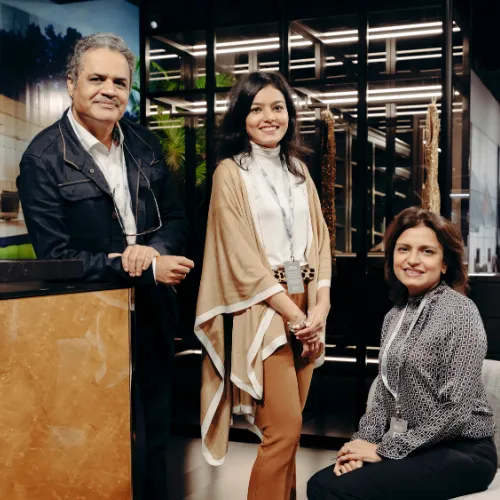Meet the Mumbai family that built a Rs 25 Cr business by bringing German luxury kitchen brands to India
Hamendra and Rati Sharma started SIS Imports in 1998, which was renamed to Plusch in 2015. Joined by their daughter Sukriti Sharma, the entrepreneurs bring German luxury modular kitchen, wardrobe, and furniture brands to India.
In 1998, while visiting Japan, Hamendra and Rati Sharma would walk to the train station every day and see a store by Poggenpohl, a leading German kitchen brand.
Captivated by the luxurious designs on display, inspired the couple to start a business that would bring luxury and modular kitchens to India.
The duo made this dream a reality in 1998 by starting SIS Imports in Mumbai, bringing Poggenpohl to the Indian market. In 2015, the business was rebranded to Plusch, and is responsible for introducing several German luxury kitchen, wardrobe and furniture brands to India.
Their daughter Sukriti Sharma, who is a partner at Plusch, tells SMBStory, “Not many people believed in my parents’ dream because no one felt there was a market for luxury kitchens [in India]. But we pioneered the movement and brought brands like Poggenpohl, Eggersmann, and Beckermann for kitchens; Interluebke and Schmalenbach for wardrobes; and COR, Draenert, and Walter Knoll for furniture.”
She claims that Plusch is presently raking in an annual turnover of Rs 25 crore, and has 80 employees across India.
Enduring a difficult start
Originally from Kanpur, both Hamendra and Rati grew up in families that dealt in the manufacturing business. While Hamendra’s father was in the steel business, Rati’s father worked in the plywood industry.
To start SIS Imports, the couple got their initial investment from their families and took up a small kitchen design store in Mumbai on rent, and imported the kitchen displays and appliances for Rs 25 lakh.
At a time when luxury kitchens were almost unheard of in India, it was unsurprising that not everyone took kindly to the business.
“People would enter the showroom in Mumbai and hurl abuse at my parents for selling a kitchen as expensive as a house in the city,” says Sukriti.
The entrepreneurs also faced challenges in getting customs clearances for the imports. Educating potential premium buyers about the feasibility and advantages of using a luxury modular kitchen made in Germany was an uphill battle as well.
As a result, it took the business six months to make its first sale. Since then, there has been no looking back as word-of-mouth brought more customers to their doorstep, helping them grow.

Hamendra Sharma (left), Sukriti Sharma (centre) and Rati Sharma (right)
Joining the family business
Sukriti became involved in the business when she was just 18-years-old.
“I was studying at King’s College in London, where I interned with Poggenpohl. During my summer holidays, I would work with my parents and assist in training employees on the shop floor,” she says.
After her graduation, she came back to India to formally join the business. Setting up a showroom in Hyderabad, she spearheaded the rebranding of the organisation from SIS Imports to Plusch.
According to her, rebranding the business to a German-sounding name complemented its drive to bring more German brands to India.
“Our clients were happy with the product quality of the luxury kitchens and started requesting us for more interior products from Germany. Hence, we tapped into more brands for new segments, such as wardrobes and furniture,” she explains.
Business outlook and competition
Essentially, Plusch is an Indian interiors business retailing premium German products as none of the manufacturing happens in India. Sukriti explains that this is important as Plusch’s USP is its high-quality products that conform to German standards.
“The brands carried by us have a lot of history and tradition. The pricing is on request as everything is tailor-made to suit a client’s space and requirements,” she says.
“Our target audience is anyone who appreciates good quality, has a keen eye for detailing and believes in German products. We have been around for 22 years, and so, many Indian architects and homemakers approach us when they are looking for top quality products,” adds Sukriti.
Over the years, numerous premium kitchen brands have entered the Indian market. Häfele, Haecker, and Veneta Cucine are some of the notable premium players in this space.
However, Sukriti claims Plusch is not premium - it is a luxury brand, and enjoys the first-mover advantage in India.
“We were one of the first luxury kitchen brands in the market and have built up our values of strong service and experience. We are present in five cities in India, and plan to expand as we collaborate with more German brands,” she says.
Market scenario
Plusch’s plans are in line with a growing market for modular kitchens, a demand driven by a rising middle-class population and increasing demands for premiumisation, according to Mordor Intelligence.
Additionally, growing partnerships between premium kitchen designers and real estate project developers are also contributing to the market growth.

A luxury kitchen design at Plusch's Mumbai showroom
However, the COVID-19 pandemic and the subsequent lockdowns have put the luxury kitchen market in jeopardy. Sukriti admits that the demand for expensive goods, such as modular kitchens, fell as potential customers deferred these purchases for ‘later’.
But demand is recovering, albeit slowly, and she remains hopeful that the market will pick up and recover completely by the next year.
“The pandemic has been difficult for our industry in general. To keep with the times, we are going strong on digital marketing, especially on Instagram and Facebook. We are doing our best to publish images of new launches, installed projects, and imagery of homes featuring our brands,” says Sukriti.
Edited by Saheli Sen Gupta










